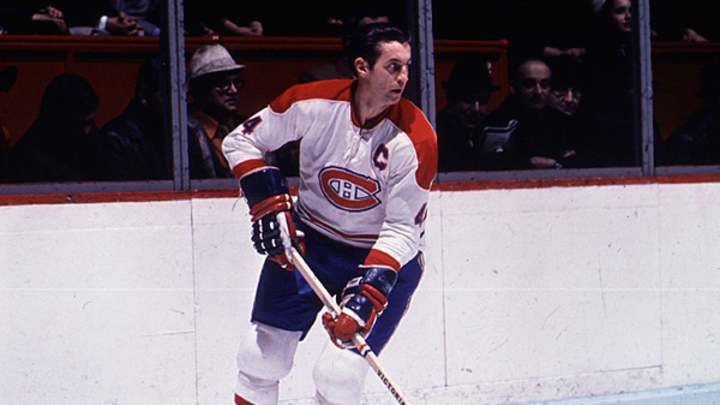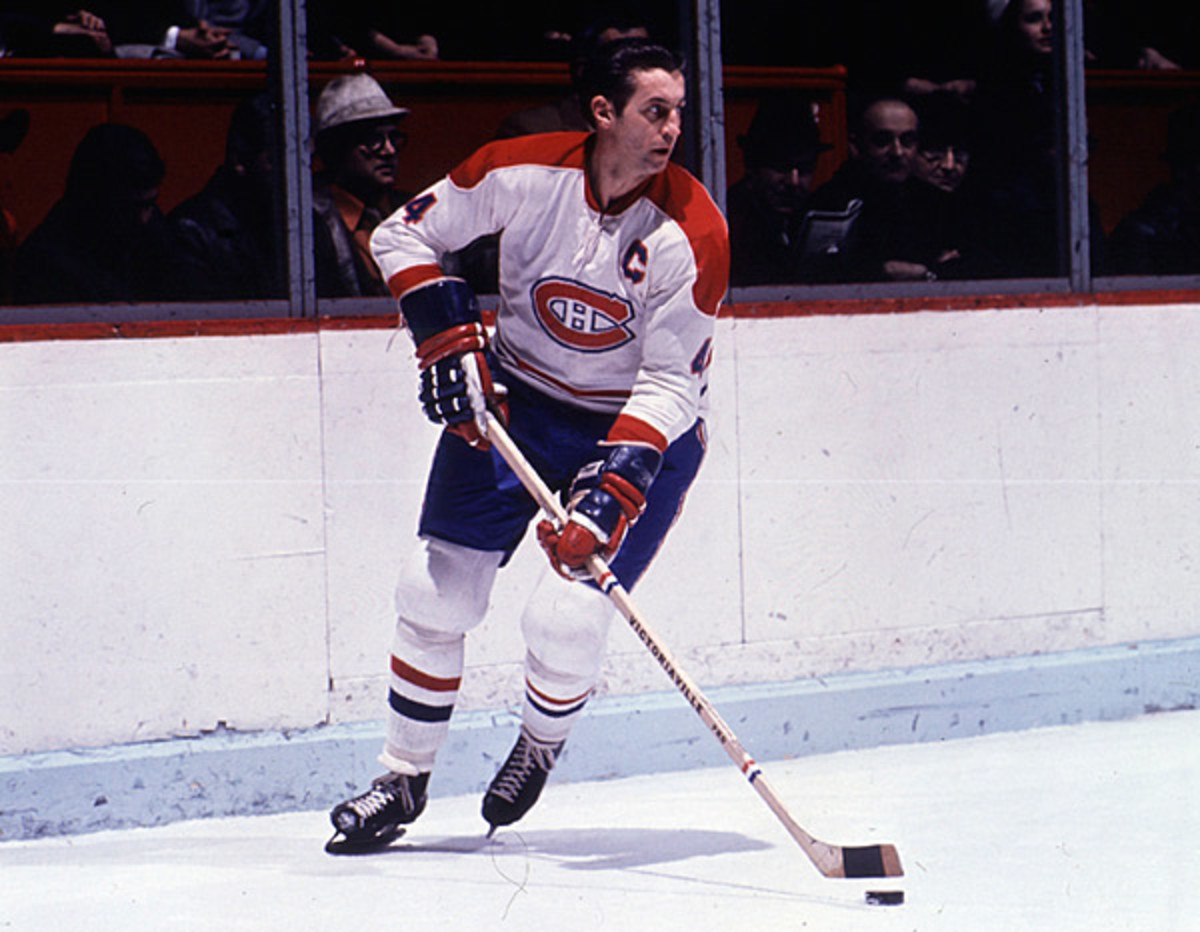Ailing Beliveau one of a kind

Big and tall, yet a graceful skater, the legendary Jean Beliveau was the personification of a classy player. (Denis Brodeur/Getty Images)

By Stu Hackel
In this darkest of seasons for Canadiens fans, the bad news continues to pile up. Their loss to Tampa Bay on Tuesday night dropped them three points behind the Islanders and Hurricanes for last place in the East. They were unable to peddle anyone other than the disappointing Andrei Kostitsyn on Monday's trade deadline day, prompting The Montreal Gazette's Red Fisher to write, "Once, teams would line up looking for help from this franchise. The view was that if a player was good enough to wear the CH, he surely had something to offer. Now, the franchise is in disarray from the top down. Now, it's an embarrassment unworthy of attention. Where has the talent gone? Where has the pride gone?"
And then the news came that Jean Beliveau, the man who personifies talent and pride -- not just for the Canadiens, but all of hockey -- had suffered a stroke, the latest of his many health setbacks. The living symbol of everything this franchise has wanted to stand for -- excellence, achievement, dignity, class, respect -- had been laid so low that Fisher concluded his Wednesday Gazette article on Beliveau with the three words he often reserves for those whose health is at grave risk: "Pray for him."
Those of you born well after Beliveau's playing career ended in 1971 may well wonder, "Who is this man I'm asked to pray for?" and it's a legitimate question.
Jean Beliveau's hockey credentials are unassailable. He is one of the very best to ever play the game, in a class with the NHL's most revered names: Gretzky, Orr, Howe, Lemieux and Beliveau's boyhood idol and teammate Maurice (Rocket) Richard. Beliveau was the game's first big center, at 6-foot-3, 205 pounds, in an era when many NHLers were under 6 feet tall and weighed less than 180 pounds. (Dick Duff, for example, who played against Beliveau for Toronto and the Rangers and was later his linemate in Montreal, was generously listed at 5-foot-9, 166 pounds but, if you've ever met him, you know he's smaller than that.)
It was rare for big men to become skilled NHLers in the Original Six era as they seemed to lack the physical coordination and nimble facility to skate well at the game's highest level. Beliveau was a marvelous skater, an exceptional stickhandler, the game's best passer. He had a strong shot and could play the game rough if he had to, even if one of his nicknames was "Gentleman Jean." The other was "Le Gros Bill," or "Big Bill" en anglais.
He was the first hockey player ever to be on the cover of Sports Illustrated (which you can see here in a Beliveau photo gallery), in January 1956. It was only his third full season, but in the accompanying article, Whitney Tower called Beliveau "a strikingly handsome young man," and one of the two best scorers in hockey -- along with the Rocket -- while recognizing his exceeding modesty, a trait he's never lost.
Tower got Canadiens GM Frank Selke to compare his two superstars. "With Maurice," said Selke, "his moves are powered by instinctive reflexes. Maurice can't learn from lectures. He does everything by instinct and with sheer power. Beliveau, on the other hand, is probably the classiest hockey player I've ever seen. He has a flair for giving you his hockey as a master showman. He is a perfect coach's hockey player because he studies and learns. He's moving and planning all the time, thinking out the play required for each situation. The difference between the two best hockey players in the game today is simply this: Beliveau is a perfectionist, Richard is an opportunist."
Selke's quest to acquire Beliveau for the Canadiens was legendary. The big center enjoyed playing senior hockey for the Quebec Aces, in the city where he had starred as a junior after leaving his hometown of Victoriaville. He had played five games on a tryout contract for the Habs, which NHL rules allowed, during two previous seasons. He scored five goals in three tryout games for Montreal during the 1952-53 season when he lead the Quebec Senior League with 124 points in 64 games. Then Selke had the Canadiens buy the entire league, which gave the team his rights. He signed Beliveau to the largest contract ever given a hockey player.
Beliveau's statistics and personal accomplishments, formidable as they were, always remained secondary to team goals. The greatest goal of all was the Stanley Cup, which he won in his third season, the first of the record five straight that the Habs would capture. He won 10 in all, and only his teammate Henri Richard (Rocket's younger brother whose birthday, coincidentally, is today, Leap Day) won more as a player (11). For five of those championships, Beliveau was the Canadiens' captain. No one has captained more Cup championships. And he was the Habs' greatest captain, a natural leader. When we think of outstanding people in the game today, Nick Lidstrom of Detroit comes to mind; the "perfect human being" as some have called the Red Wings captain. Well, Beliveau is that kind of person.
I began following Beliveau's career just after he was named the Canadiens' captain. From what I read as a pre-teen and teenager -- and I devoured everything I could about hockey, buying every publication available -- he was the game's best captain.
Before writing this, I ran up to the attic and pulled out a handful of old hockey magazines from the '60s. Beliveau is regularly on the covers, along with Henri Richard, Bobby Hull and Gordie Howe, the game's biggest stars. In November 1962, Audrey Dixon, the secretary of the Rangers Fan Club, wrote a story for Hockey Illustrated ranking the NHL's most handsome players. Beliveau topped the list. His methodical style and penchant for passing rather than shooting is the theme of a critical January 1963 Hockey Illustrated cover story. Two years later, however, in January 1965, he's on their cover again and they call him "The Clutch Player of the Decade."
Still, the Habs had not yet won the Cup with him as captain. All that changed in the Spring of '65 when he led them to a seven-game victory over the Black Hawks (that's how it was spelled back then, two words), much to my lifelong exhilaration since Canadiens goalie Gump Worsley was my hockey hero. And who scored the winning goal in Game 7? Beliveau, just 14 seconds into the game, finishing off the play after a bad Hawks turnover, raising his stick with two hands, as he always did, and showing a big smile on his face.
When the game, a 4-0 shutout by Worsley, was over, Beliveau was awarded the first Conn Smythe Trophy as playoff MVP, and he spoke to the delirious fans at the Montreal Forum in his characteristically distinguished manner.
In November 1965, Hockey Illustrated's cover story asked the question, "Is Jean Beliveau the Greatest Stanley Cup player of All Time?" and made the case he was. The next spring, Montreal repeated, beating Detroit in six games after dropping the first two on home ice. Henri Richard scored the series winner, a strange goal, in overtime. Sports Illustrated ran a full page photo of Worsley hugging Beliveau at the end of the game, little Gump's head coming up to big Beliveau's shoulder. I had that photo on the wall in my bedroom for years.
Beliveau's team would win three more Cups, the most unlikely being in 1971 against the highly favored Black Hawks again after knocking off Bobby Orr, Phil Esposito and the Big Bad Bruins, the defending champs.
When Henri Richard publicly criticized coach Al MacNeil for benching him during the playoffs, it was Beliveau who calmed Richard and kept the dressing room intact.
When his playing days ended after that championship, Beliveau became an executive with the Canadiens and an ambassador for the team. In that capacity, his name was stamped on the Cup another seven times. No one has their name on it more. He headed up a charitable foundation established upon his retirement as a player in 1971 and in 1993 turned it over to the Society for Disabled Children and remained active raising funds for it.
Unofficially, he has always been an ambassador for the sport. Early in his career, the Habs' main antagonist was Detroit. Ted Lindsay, his fierce rival with the Red Wings, called Beliveau the game's greatest ambassador ever. Gordie Howe, not a bad one himself, grew to become a good friend, and the Canadiens asked him to introduce Beliveau to the Bell Centre crowd on the night the club celebrated its 100th Anniversary in 2009.
Exceedingly polite, always articulate -- even in his second language -- and charismatic without an ounce of effort, Jean Beliveau is a unique man. So revered is he throughout Canada that he was asked in 1994 to be Governor-General, a position he declined for family reasons, so he and his wife could help their daughter raise his granddaughters after their father had committed suicide. The man has his priorities straight.
"Numbers and individual achievements don’t begin to describe what Béliveau has meant to the Canadiens organization, to people everywhere," Red Fisher writes. "Eighteen seasons with the Canadiens, his last 10 as captain; 10 Stanley Cups; two Hart trophies, one Conn Smythe; 507 goals and 712 assists in 1,125 games; 176 points in 162 playoff games. Stunning numbers, but they pale in comparison alongside the love and respect other players, old and new, and the people...his people...have for him and he for them."
I've met Beliveau perhaps a half-dozen times over the years at various hockey functions and at the old Forum. He always spoke with me as if we were well-acquainted, and we were not. He could not have remembered me, given all the people he'd met in his life, but that was his way, to make you feel special in his presence. And he's a good deal taller than I am (I'm more Dick Duff-sized), but my memories of our meetings and conversations don't include me looking up at him. It's as if Jean Beliveau has some magical power to not lord his superior height over those who are shorter. That would be his way, too.
Red Fisher is right. You should pray for Jean Beliveau.
COMMENTING GUIDELINES: We encourage engaging, diverse and meaningful commentary and hope you will join the discussion. We also encourage, but do not require, that you use your real name. Please keep comments on-topic and relevant to the original post. To foster healthy discussion, we will review all comments BEFORE they are posted. We expect a basic level of civility toward each other and the subjects of this blog. Disagreements are fine, but mutual respect is a must. Comments will not be approved if they contain profanity (including the use of punctuation marks instead of letters); any abusive language or personal attacks including insults, name-calling, threats, harassment, libel and slander; hateful, racist, sexist, religious or ethnically offensive language; or efforts to promote commercial products or solicitations of any kind, including links that drive traffic to your own website. Flagrant or repeat offenders run the risk of being banned from commenting.
